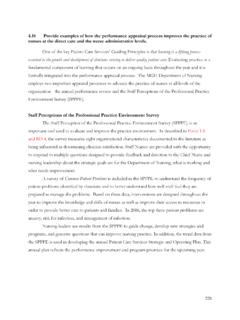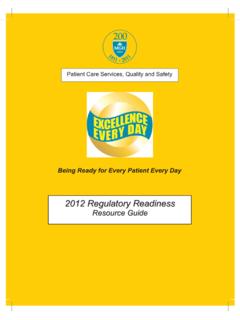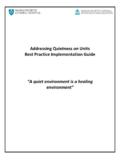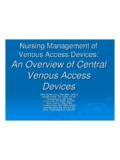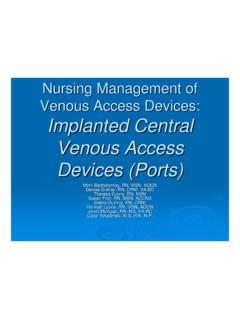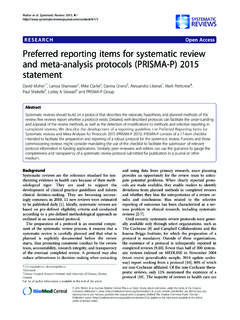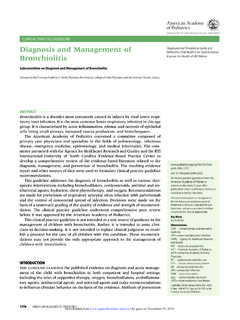Transcription of 2017-2018 Joint Commission Regulatory Readiness Resource …
1 2017-2018 . Joint Commission Regulatory Readiness Resource Guide Joint Commission National Patient Safety Goals Identify patients correctly Always use 2 patient identifiers Two person verification for blood product administration Improve staff communication Report critical results on a timely basis Use medications safely Label all medications and solutions Utilize and teach safe practices for anticoagulation therapy Maintain and share accurate patient medication information Use alarms safely Respond promptly to every clinical alarm Individualize parameter limits for the patient Prevent Infections Use hand hygiene Adhere to Infection Control guidelines Educate patients and families Identify safety risks Identify patients at risk for suicide or self-harm Universal Protocol Conduct a pre-procedure check, mark the site, and perform a Time Out/Pause to verify 2. Quality Assurance Performance Improvement (QAPI). Quality: Know your unit-specific Quality Data and Improvement Plans Prevent Falls, Pressure Injury and Hospital Acquired Infections Utilize IPASS for handovers Speak Up for Safety: Share errors and near misses through narratives and filing of safety reports Keep suicidal patients in sight at all times.
2 Use the suicide checklist and order set Scan all medications before administering Report eCare related safety concerns Excellence Every Day: Enhance the Patient Experience: Provide Efficient, Effective, Equitable, Timely, Safe, Patient-Centered Care Promote patients' understanding of safe use and side-effects for medications Facilitate Quiet at Night Increase the use of Interpreter Services 3. TABLE OF CONTENTS. TOPIC PAGE. National Patient Safety Goals .. 2. QAPI .. 3. Excellence Everyday .. 5. Resources for Patients, Families and Staff .. 6. Joint Commission Hospital 8. Assuring Quality of Care .. 15. Nursing Sensitive Indicators - NSI .. 15. Falls .. 15. Pressure Injury .. 16. 17. CLABSI .. 18. Restraints .. 19. Pain Assessment .. 20. PCS QAPI Initiatives - Patient Satisfaction .. 22. Culture of Safety .. 23. Assuring Patient Safety .. 24. Transfusion Therapy .. 24. Point of Care Testing (POCT) .. 26. Critical Results.
3 28. Medication Safety .. 29. Alarm Safety .. 32. Antimicrobial 32. Infection Control .. 33. At Risk Patients .. 39. Time Out /Universal Protocol .. 40. Preparing for Patient Emergencies .. 43. Environment of Care .. 46. Spills and MSDS .. 47. Clinical and Support Resources for Staff .. 50. 4. EXCELLENCE EVERY DAY. At Massachusetts General Hospital, our Excellence Every Day philosophy means we commit to providing the best possible care to every patient and family in every moment of every day. We are focused on meeting the needs of patients and families by creating systems that support the highest level of quality and safety. Our efforts to achieve Excellence Every Day include validation by the American Nurses Credentialing Center's designation as a Magnet hospital and by external Regulatory agencies in the form of on-site surveys. MGH is visited by the Joint Commission every 3 years to validate that we are meeting standards and continuing to provide exemplary, safe care to our patients.
4 Other important surveys we participate in are those that recognize excellence and/ or are required to validate advanced, disease specific, certifications. Examples include: Joint Commission Laboratory survey Joint Commission Comprehensive Stroke Certification survey Joint Commission Left Ventricular Assist Device (LVAD). Certification survey CMS End Stage Renal Disease licensure survey Massachusetts Department of Mental Health licensure survey Massachusetts Department of Public Health (DPH) Infection Control survey Thank you for your contributions to our success in providing an environment where the EED philosophy comes alive for our patients, families and the entire MGH community. You are Simply the Best! 5. RESOURCES FOR PATIENTS, FAMILIES AND STAFF. Mass General Patient Guide ~ located on each inpatient unit Patient Rights and Responsibilities ~ located on each unit The Maxwell & Eleanor Blum Patient and Family Learning Center o A health information Resource center available to Mass General patients, families and staff o The PFLC staff can help with information searches and provide a variety of pamphlets, periodicals, books and videos on many health- and disease-related topics o Computers with Internet access are available for on-site use.
5 O White Building, 1st Floor, Room 110 (617) 724-7352. o o Monday Friday, 9am 4:30pm; closed weekends and holidays Medical Interpreter Services o Provides professional interpreters for all limited English proficient (LEP), deaf and hard of heard (DHH) patients o Patients have a legal right to a professional medical interpreter 24/7. free of charge whether it is in person, over the phone or by video o Using family members or other staff to interpret is strongly discouraged Call 617-726-6966 for a professional interpreter o When a patient insists on using a family member, they must sign a waiver form o More information on MGH Interpreter and Translation services is available at: MGH Disability Program o Assists patients during their MGH visit o Helps patients with disabilities, and their caregivers, to plan visits o Responds to concerns and suggestions regarding access 6. o Provides support and services including but not limited to necessary accommodations: - Specialized Call Bells - Hearing Enhancers and Magnifiers - ASL interpreters or Communication Access Realtime Translation (CART) Services - Patient lifts - Wheelchair accessible scales - Large print documents, Braille - Portable Video phones for the Deaf - Wheelchair accessible shuttles - Accessible rooms and bathrooms (if one is not available at the time of admissions every effort will be made to transfer the patient when one becomes available).
6 - Height adjustable accessible exam tables - Ambassador or volunteer wheelchair escort For more information call the disability program manager at 617-726-3370 or check our webpage Optimum Care Committee o Representatives are available to clinicians, patients and families to help address ethical issues o Consults may be placed Monday Friday from 8:00a - 4:00p (except on holidays observed by MGH). o Partners Telephone Directory Ethics Support PHS Page Status You will find the phone # to call or person to page for consult intakes Office of Patient Advocacy o Supports patient's rights and responsibilities o Serves as liaison to patients, family and staff to resolve healthcare concerns and grievances 7. o Provides accommodations and other services to patients with disabilities to ensure equitable care o Serves as hospital civil rights officer o (P) 617 726-3370. o Email: WHAT WILL THE Joint Commission SURVEYORS REVIEW. DURING THE GENERAL HOSPITAL SURVEY?
7 The Joint Commission survey is designed to confirm that a hospital follows its own guidelines and policies as well as national standards. The JC general hospital survey will be 5 days in length. Using the patient's medical record as a road map, surveyors will assess the care provided to patients in both inpatient and ambulatory sites. A surveyor will arrive at your practice area accompanied by MGH leadership. The surveyor will: Review a patient's record with caregivers Observe care Interview caregivers Interview patients Tour the unit The nurse caring for the patient the Clinical Nurse Specialist / Nursing Practice Specialist and/or Nursing Director will participate in the record review. Because the surveyor will not know how to navigate the MGH. patient record, they will ask you to help locate the documentation they want to review. As the surveyor tours the unit and observes care, he or she may interview other members of the healthcare team including UCs, PCAs, NPs, PAs, physicians and allied health professionals.
8 Patient interview The Joint Commission surveyors will ask the nurse caring for the patient if the patient is able to be interviewed. If yes, the JC surveyor will interview the patient and family without other members of the healthcare team present. 8. Questions to patients and families may include such topics as: Patient and family education Advance directives (Health Care Proxy). Patient and family participation in care planning Pain management Staff responsiveness o Help when they need it o Response to questions Continuity of care Understanding of medications Preparation for discharge Environment noise, cleanliness Remember Surveyors know the standards, but YOU know your practice, your patients and their families Breathe and take your time answering the surveyor's questions, be direct and to the point with your response You will not be alone, your Nursing Director, CNS/ NPS and others will be there to support you If you don't know the answer to a question, it's okay to say I don't know but I do know where to find the answer.
9 A full list of resources can be found at the end of this book Tell positive stories! If the surveyor asks you a question that relates to a special project on your unit or in the hospital talk about it! How does the JC Surveyor trace a patient's MGH experience? The surveyor will ask you to navigate your patient's electronic medical record in order to trace the patient's care via associated documentation. The surveyor will ask you to show them documentation in the electronic record including: 9. Admission overview and assessment (Initial Nursing Assessment). Advance directives/health care proxy available or documentation regarding a discussion about HCP is present in record. 1. The HCP is found in the maroon book if it has been provided during the current admission 2. It is found in the Advanced Care Planning module or the Media tab if it has been previously scanned Accurate and up-to-date allergies Consent for surgery/procedures (found in the maroon book for current admission).
10 Timeout/Universal Protocol completed for every invasive procedure that requires an informed consent Progress Note o Provides a synthesis of the patient's overall progress o Focuses on problems that are not progressing in the Plan of Care (POC). o Documents assessments that need to be captured outside of flowsheet Transfer of care o Note should be a synthesis, the same as a progress note o Reviews the POC, problems should be up-to-date and resolved if no longer active o Review and update the Education activity Plan of Care (POC) Activity o Individualized for the patient o Based on assessment and re-assessment of the patient's specific risk factors o Progression of problems toward end goals is up-to-date (progressing, not progressing, resolved). o Patients at risk for falls, pressure injury, suicide or self-harm have these problems documented in the POC activity and flowsheet o Discharge planning 10. Educational Activity o Patient and family preferred learning style is identified o Patient and family education has been implemented o Patient/family understanding of educational content has been evaluated o Patient and / or family understands medications and side effects Flow Sheet Activity o Timeout flowsheet (aka Universal Protocol).

